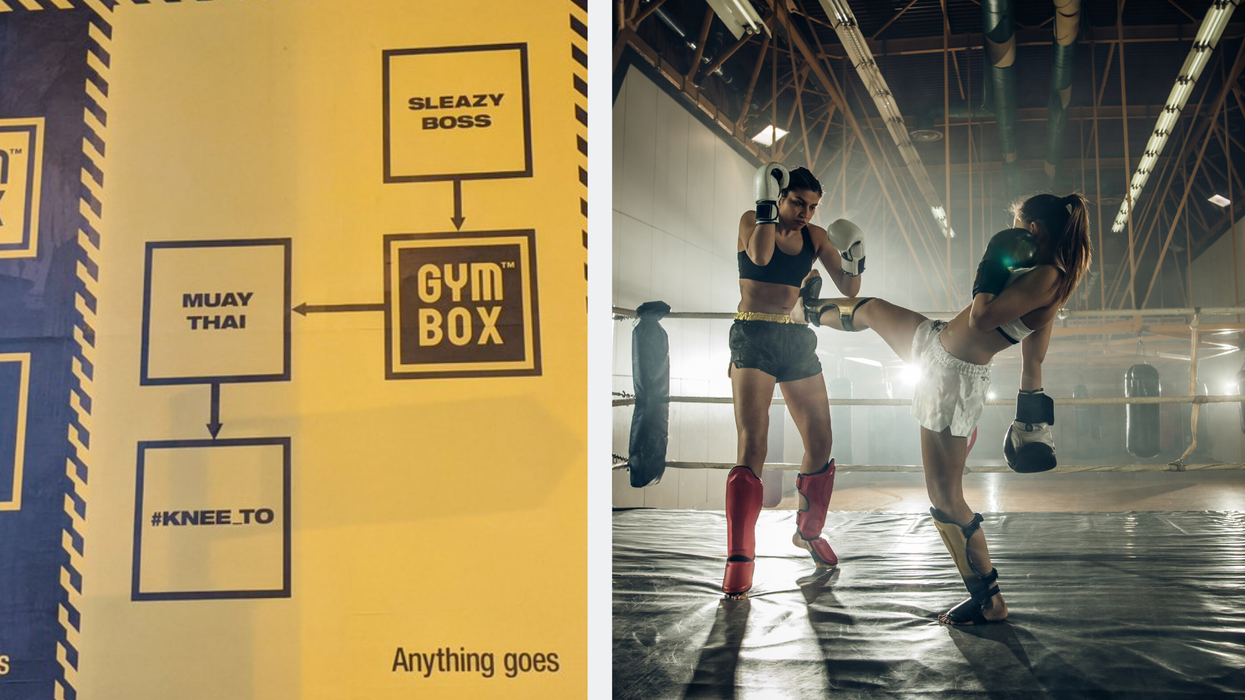
Walking home yesterday evening (ironically from the gym), in a rare moment of not staring at my phone screen, I spotted a large billboard.
It was an advert for Gymbox, the self-proclaimed “rebel” boutique London gym that uses a “no excuses, no surrender” rhetoric to market its range of high-octane classes.
Gymbox has always had a unique ‘tongue-in-cheek’ approach to advertising compared to other gym brands – their founder is a former advertising executive after all – and regularly makes references to pop culture in ad campaigns.
This has landed the brand in hot water before; in 2009 Gymbox adverts promoting "Chav Fighting" and "Bitch Boxing" led to complaints to the Advertising Standards Agency (ASA), although they escaped a ban on the offending materials.
It doesn’t look like they’ve learned their lesson though.
All three adverts on the Gymbox billboard I spotted – freshly installed to hoover up those with exercise-related new year’s resolutions – were incredibly tone deaf. One suggested people who had a “fetish” for women’s clothing but couldn’t find any that fitted join Gymbox to solve the issue.
Another seemed to imply Gymbox clients could gain “respect” from children on “the local estate” by boxing.
But perhaps the worst offender of the three was the section of the billboard I snapped a picture of and posted to Twitter.
It was a flow chart, that read “Sleazy boss – Gymbox – Muay Thai – #Knee_To’.
To spell it out in layman’s terms, Gymbox’s suggestion seems to be that those experiencing sexual harassment at work (the context heavily implying they were referring to women) can solve the issue by joining a martial arts class and simply physically attacking their offending boss (also implied to be male).
Late-stage capitalism… I must politely request that you stop, immediately. Where to even begin with the levels of cynicism and disrespect present in this advert? What were the Gymbox ad team smoking to think this was a good idea?
First and foremost, to suggest the onus of dealing with workplace harassment falls solely on women is terrible and plays right into the victim-blaming narrative we’ve been trying so hard to eradicate.
Oh, you’re being sexually harassed? No, please don’t go to HR. Instead, you must pay over £100 a month to learn Muay Thai and if you don’t… I’m afraid that’s on you!
Secondly, to co-opt the language of #MeToo so brazenly (I mean… #Knee_To?! Really?! Do we not deserve better?!) and in such a smirking, knowing way is enraging.
The way we talk about workplace harassment – and harassment in general – is often neutered by language we use and people can forget that behind that clinical phrase are very real and very traumatic experiences.
In 2016, the Trades Union Congress and Everyday Sexism project teamed up to investigate sexual harassment at work, in a report that included verbatim quotes of what sufferers had experienced.
“On my last day at work, a colleague told me that his biggest regret was that he didn't get the chance to rape me in the store room before I left. For months I had been scared to go into that room on my own because he always said things like, ‘I'm coming to get you’ and ‘don't go in there alone, I'll jump on you,” one woman recounted.
Another woman, who worked in a law firm, recalled how a male colleague would ask her if she slept with the judge every time she won a case, or say her success was down to “wearing a skirt”.
A third said one staff night out a considerably older male colleague reached over and grabbed her boob, while in a circle of other men they both worked with. All the men laughed. None challenged the groper.
A 2017 survey found over 40 per cent of women in the UK had experienced sexual harassment of some sort in the workplace.
Workplace harassment isn’t a joke and it certainly isn’t a marketing tool. The TUC report found that harassment in the workplace had a “serious professional, financial, and psychological impact” on those who experienced it.
A quarter of women under 30 fear reporting harassment in case it loses them their jobs.
And yet Gymbox is trying to monetise this fear and a global movement that’s aimed at getting women to speak out about experiencing harassment and abuse that includes sexual assault and rape.
I wonder too what their own company record on harassment is, both for clients and employees. The fitness industry has a major problem with sexual harassment in gym spaces.
Yet, perhaps the most painful thing of all about this is that Gymbox surely can’t be ignorant to the degree that they wouldn’t realise how this advertising tactic would be received. Behind this brand are savvy operating professionals who’ve built the business into a juggernaut worth over £60m.
They must know. Are they deliberately trying to gain publicity and press from the outrage that will surely follow a campaign that has such contempt for the experiences of harassment victims?
I’m sad to be giving them what – in my opinion – they seem to want. But brands need to realise that not every movement can be co-opted for profit. Behind that 40 per cent stat are thousands of real women who’ve been degraded and humiliated in the workplace. It’s not on them to remedy that by paying through the nose to learn a combat sport.
Catch me outside, Gymbox.
Indy100 has reached out to Gymbox for comment.













